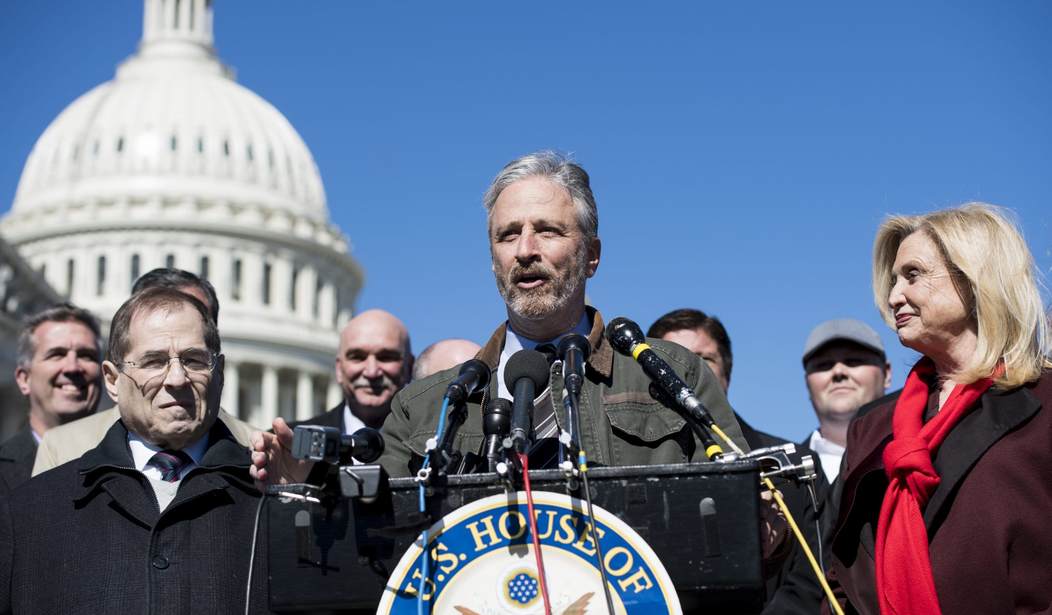ARLINGTON, Va. – Former Daily Show host Jon Stewart said there’s “nothing” as “insolating” as the loss of a loved one, particularly for military families, but groups like Tragedy Assistance Program for Survivors (TAPS) fill a “void” in America.
“I’m of the subgroup of males who does not process emotion well and I probably, well, there’s nothing, I think, so isolating in many ways as illness or grief especially when you see the military families,” Stewart said earlier this month at the launch of the Tragedy Assistance Program for Survivors (TAPS) Institute for Hope and Healing, which will help grieving families cope with the loss of a loved one.
“There’s this group of individuals who are built for service and give selflessly for our freedoms, and yet we go about our day kind of taking it for granted,” he added. “And then within the military community, when someone suffers a loss, now they are even further isolated from that community so it’s further and further.”
Stewart said members of the military and their families are the “finest people we have.”
“The fact that you can be there and there is a group that can understand that and provide that kind of solace and try and fill in those gaps, and it’s a loss that, when you talk about closure and about loss, that hole will never be filled,” he said. “The sad truth is we don’t have experts in this country at that but Bonnie [Carroll, president of TAPS] and TAPS because, sadly, they have been through it.”
Carroll, a 2015 recipient of the Presidential Medal of Freedom, is an Air National Guard and U.S. Air Force Reserves veteran whose husband died in an Army C-12 plane crash on Nov. 12, 1992.
Stewart emphasized the importance of mentor programs that connect members of the military to grieving families.
“Grief is still this really strange area, this taboo that I think is really tough for people to think about and Bonnie, to her very credit, used her loss as kind of a springboard to be there for others who were in that same situation,” Stewart said during a Connecting Vets interview at the event.
“They have military members who become mentors to families that have lost. I think, especially for the children, to see someone who is like their dad or like their mom who is in the military who understands what they do – little things you don’t think about. If a loved one is lost during service and you live on the base, you don’t live on the base anywhere. As isolating as grief can be, that’s even more traumatic,” he added.
According to their official website, “TAPS provides ongoing emotional hope, help, and healing for anyone grieving the loss of a loved one in military service to America, regardless of relationship to the deceased, geography, or circumstance of the death. TAPS meets its mission by providing peer-based support, crisis care, casualty casework assistance, and grief and trauma resources.”
Stewart, who has entertained the troops overseas through the United Service Organizations (USO), said his family copes with tough times through laughter but every situation is different.
“The interesting thing is everybody deals with it differently, and that’s how I deal with it,” he said. “Everybody is different and that’s what’s so great about this is – it’s a process that tells people, hey man, there is no right or wrong way to do this and there is no timeframe, right or wrong, to do it – just embrace who you are and get through it that way.”
The same day as the TAPS event, Stewart joined first responders and members of Congress to oppose Office of Management and Budget Director Mick Mulvaney’s proposal to move the World Trade Center Health Program from the National Institute of Occupational Safety and Health to the National Institutes of Health (NIH).
“I want to congratulate Mick Mulvaney on a job well done,” Stewart said. “It is a special kind of incompetence to take a program that was fought for for 15 years by firefighters, police officers, first responders and survivors that has finally come to fruition and is finally working well. It’s a special kind of incompetence to want to turn that thing upside down.”









Join the conversation as a VIP Member